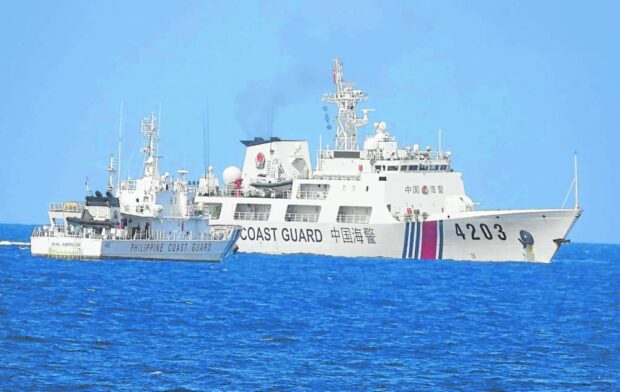
CLOSE QUARTERS A China Coast Guard vessel closely guards a Philippine Coast Guard ship supporting a resupply mission to Ayungin (Second Thomas) Shoal in June last year. —PCG PHOTO
The Philippines and China have agreed to “avoid escalation of tensions” in the West Philippine Sea, particularly in the Philippine-occupied Ayungin (Second Thomas) Shoal, during their latest dialogue on the maritime dispute.
The Department of Foreign Affairs (DFA) announced on Thursday that the two sides convened the eighth Bilateral Consultation Mechanism (BCM) on the South China Sea in Shanghai, China.
READ: China envoy summoned over ‘aggression’ in West Philippine Sea
As heads of their respective delegations, Foreign Undersecretary Ma. Theresa Lazaro and Chinese Assistant Foreign Minister Nong Rong had “frank and productive discussions,” the DFA said.
It reported that both sides “agreed to calmly deal with incidents, if any, through diplomacy” and that “continuous dialogue is important to keep peace and stability at sea.”
The DFA added that both parties also agreed to “improve maritime communication mechanism in the South China Sea” and initiate talks on possible academic exchanges on marine scientific research between their scientists.
The BCM was convened in line with the agreement reached last November between President Marcos and President Xi Jinping in San Francisco “to ease and manage tensions in the South China Sea,” according to the DFA. The agreement was followed by a phone conversation between Foreign Secretary Enrique Manalo and Chinese Foreign Minister Wang Yi in December.
Despite the November talks, however, Philippine officials complained that Beijing’s actions contradicted Xi’s commitments in San Francisco.
Aggressive acts
“It is not us who is escalating [the tensions] or provoking China,” Commodore Jay Tristan Tarriela, Philippine Coast Guard deputy chief of staff and spokesperson, said in an INQSide Look interview. “We have just been on the receiving end of the aggression of the China Coast Guard and the Chinese maritime militia,” he said, adding that the Philippines has “exerted so much effort” to ease tensions in the South China Sea.
But shortly after the Marcos-Xi talks, “there were still reported aggressive behavior by China Coast Guard harassing Filipino fishermen,” he pointed out.
Tarriela said that as a country with democratic values, the Philippines could not counter Beijing “with the same amount of force or the same amount of aggression.” As a result, the government has undertaken a “very effective” information campaign to show the truth that is damaging Beijing’s bid to become a respectable superpower.
“We believe that by documenting these aggressive actions of the Chinese coast guard and the Chinese maritime militia, we are actually damaging the reputation of China as a country in the international community,” he added.
“What we are doing is documenting it and telling the world that these are the illegal actions of China and they have been hurting diplomatically,” Tarriela said, citing the international condemnation of Beijing’s actions. —WITH REPORTS FROM NESTOR CORRALES AND AFP

